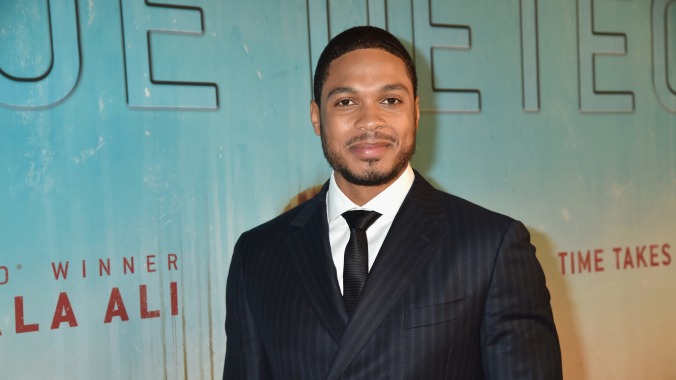Ray Fisher gets specific with allegations of racism during Joss Whedon's Justice League reshoots

Although Justice League actor Ray Fisher first spoke up about his issues with the filming of the 2017 superhero flick back in July—including accusations that replacement director Joss Whedon was “gross, abusive, unprofessional, and completely unacceptable” in his treatment of its cast and crew—he’s never gone into much detail about what actually went down on the film’s set after Zack Snyder was forced to depart it. That changed today, though, when Fisher gave an interview to Forbes, outlining at least some of his issues with the behavior of Whedon, producer Geoff Johns, and others who worked on the film, including allegations that “The erasure of people of color from the 2017 theatrical version of Justice League was neither an accident nor coincidence.”
That was apparently the inciting incident for Fisher to speak out. The actor was also upset that Whedon’s reshoots reduced screen time or outright cut performances from multiple actors of color, including Zheng Kai (playing Ryan Choi), Joe Morton (whose roll as Cyborg’s father was reduced), and Karen Bryson and Kiersey Clemons, whose parts as Cyborg’s mother and Iris West were fully cut. (As Forbes notes, all of these parts are set to be restored by Zack Snyder’s Justice League.)
Fisher also says that he was later made aware of “blatantly racist conversations” that occurred before Justice League was reshot, apparently centered largely on Johns, Jon Berg, and current Warner Bros. Pictures Group chairman Toby Emmerich. “I realized that the notes I ended up getting from Johns during reshoots were just a coded version of the racist things he was saying with behind closed doors with the other execs,” Fisher said. The studio previously suggested the actor was out of line with claims that people like current DC Films president Walter Hamada were manipulating messaging around the movie to try to protect Johns or Berg.
Fisher went into (some) detail on other complaints related to the reshoots, too, as when he stated that Warner Bros. lied to the film’s cast that Whedon was Snyder’s hand-picked successor to take over the movie:
For one thing, the cast and crew were told that Zack had handpicked Joss to finish the film for him. I didn’t find out until after the reshoots that that was a complete lie. I heard whispers and rumblings of things being off behind the scenes, but nothing concrete until much later. They had us go out to San Diego Comic-Con in 2017 and say Zack picked Joss and that Joss was a great guy. I still have the email with those talking points.
Fisher also stated that “Race was just one of the issues with the reshoot process. There were massive blowups, threats, coercion, taunting, unsafe work conditions, belittling, and gaslighting like you wouldn’t believe.” He added that, “Geoff Johns made a veiled threat to my career during the LA reshoots of Justice League. Multiple sources have informed me, that Joss threatened the career of another person associated with the production. Toby was made aware and tried to cover for Whedon rather than deal with the abuse.”
And while some of this is still vague, it is the most concrete information we’ve gotten to date about Fisher’s problem with Whedon and Johns’ behavior on the film. (All of which is made all the more interesting and fraught in light of the fact that he’s involved in the filming of additional scenes for Snyder’s cut of the movie.) Fisher will presumably have more to say after the long-awaited third-party investigation of the shoot has been concluded; according to the actor, the initial firm performing the investigation ended up withdrawing, and a new one—allegedly the same one that found evidence of wrongdoing committed by former Warner Bros. CEO Kevin Tsujihara—has now been brought on to look into the film’s climate.
A representative for Whedon later responded to Fisher’s claims, pushing back on an allegation that Whedon had had an actor’s skin color digitally altered in post-production because “he didn’t like their skin tone”:
The individual who offered this statement acknowledged that this was just something that he had heard from someone else and accepted as truth, when in fact simple research would prove that it was false. As is standard on almost all films, there were numerous people involved with mixing the final product, including the editor, special effects person, composer, etc. with the senior colorist responsible for the final version’s tone, colors, and mood. This process was further complicated on this project by the fact that Zack shot on film, while Joss shot on digital, which required the team, led by the same senior colorist who has worked on previous films for Zack, to reconcile the two.